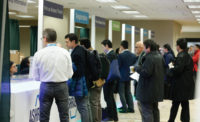Three tours will be available, each for a nominal fee. Sites include Atlantic City’s Convention Center, the central energy-generating plant of the Atlantic City District Energy System, and Stockton College.
HISTORIC ATLANTIC CITY
The first technical tour is scheduled for Sunday, Jan. 13 from 3:15 to 5:30 p.m., and it will involve the City of Atlantic City, Historic Atlantic City, and the Convention Center of Atlantic City.The state of New Jersey’s decision to redevelop the hall was based on a three-fold vision of reinvigorating the historic structure as an entertainment center, a headquarters for the Miss America Organization, and a permanent site for athletic and concert events.
This project includes renovation of the historic Atlantic City Convention Center into a special events hall/center for events ranging from concerts to sporting events, including the Miss America Pageant, as well as a home to a proposed minor league hockey franchise.
The project includes 18 air-handling units (nine on each side within roof truss areas); 14 built-in-place units were totally replaced, and four were rehabbed in place. A chilled-water system includes two large plate-and-frame heat exchangers with three 100-hp (746-kW) variable-flow pumps. Steam feeds AHU preheat coils as well as the original radiators in the beautifully restored, 1929 vintage lobby. The cost is $10 per person.
ATLANTIC CITY DISTRICT ENERGY SYSTEM
The second technical tour will take place at the Central Plant on Monday, Jan. 14 from 2:30 to 5:30 p.m. The Atlantic City District Energy System provides steam heating and chilled-water refrigeration to seven casino hotels as well as the new Atlantic City Convention Center and existing Convention Hall.The system is comprised of a central energy-generating plant called the Midtown Thermal Control Center (MTCC), a number of satellite energy-generating facilities, approximately 20,000 linear ft (609 m) of steam, chilled-water and condensate piping, a fiberoptic network for system control and monitoring, and energy-transfer facilities located on the premises of customers.
The steam and chilled water are distributed via two underground distribution piping loops (i.e., a heating and cooling loop) to energy-transfer stations located on the customer’s premises.
Each loop consists of both a supply line and a return line. The supply lines provide chilled water and steam to a plate-and-frame heat exchanger or pressure-reducing station, respectively.
After use, steam is condensed and returned to the MTCC for reuse in the generation cycle. Likewise, chilled water is returned to the MTCC for reuse in its cycle. The cost for this tour is $10 per person.
STOCKTON COLLEGE
The third technical tour will take place Tuesday, Jan. 15 from 1:30 to 5:00 p.m. at Stockton College, a public, undergraduate college of arts and sciences located in the Pine Lands of southern New Jersey, 12 miles northwest of Atlantic City.The campus buildings were constructed in three stages: Phase I (Wings A through D including CC) was completed in 1971, Phase 2 (Wings E through H) was completed in 1973, and Phase 3 (Wings I through M) was completed in 1975.
By 1990, the hvac units were reaching the end of their useful lives, and an engineering firm was retained to study the situation.
The study compared the costs and projected energy savings of both a direct replacement of the existing units and a replacement with ground-coupled water-source heat pumps. Projections showed that a geothermal system would cost about $1.2 million more to install, but that it would be expected to save $330,000 in energy costs. Thus, the simple payback of the extra costs of the geothermal system would be about 3.5 years.
With additional funding from the state of New Jersey obtained in 1992, a contract was awarded for the retrofit, and the geothermal system was installed in 1993. The new heat pumps were lifted to the rooftops, and the old units removed in a day and a half by helicopter during the 1993 Christmas break. In mid-January 1994, when classes began, the new geothermal system was turned on. The cost for this tour is $20 per person.
Sidebar: Free Meetings Available
In addition to the continuing education classes and short courses presented by ASHRAE, a new mix of free educational seminars will be available to engineers, contractors, wholesalers, and other hvacr professionals who visit the show.Each of the following six sessions (offered by AHR Expo and several endorsing associations) will be presented by experts from one of the 16 industry associations endorsing the 2002 AHR Expo and its honorary sponsor. The 2002 topics include:
Introduction to AABC Standards 2002
Presented by the Associated Air Balance Council (AABC)
Monday, Jan. 14 — 10 a.m.
Using Standard 52.2 in Filter Selection for Potential Bioaerosol Intrusion
Presented by the National Air Filtration Association (NAFA)
Monday, Jan. 14 — 10 a.m.
Technology Roadmap for Intelligent Buildings Technologies
Presented by the Continental Automated Buildings Association (CABA)
Monday, Jan. 14 — 1 p.m.
Cooling Tower Operation and Maintenance For Improved Energy Efficiency
Presented by Cooling Technology Institute (CTI)
Monday, Jan. 14 — 1 p.m.
Smoke Management Systems and New Code Developments
Presented by the Air Movement and Control Association International (AMCA)
Tuesday, Jan. 15 — 10 a.m.
Effective Ventilation Training Equals Quality Installations
Presented by the Heating, Refrigeration and Air Conditioning Institute of Canada (HRAI)
Tuesday, Jan. 15 — 1 p.m.
Publication date: 01/01/2002



